2023-10-07 Sat
■ #5276. 世界英語における子音と母音の変容 --- 大石晴美(編)『World Englishes 入門』(昭和堂,2023年)の序章より [world_englishes][vowel][diphthong][consonant][contact][substratum_theory][phonetics][phonology][variety][th][we_nyumon]
「#5268. 大石晴美(編)『World Englishes 入門』(昭和堂,2023年)」 ([2023-09-29-1]) で紹介したこちらの本の序章において,標準英語で用いられる子音や母音の音素が,世界英語の諸変種では母語からの影響を受けて異なる発音で代用される例が挙げられている.
まず「子音が母語からの影響を受ける例」を挙げてみよう (12) .
| 子音の変容 | 英語変種 |
|---|---|
| [θ] [ð] を [t] [d] で代用(歯摩擦音が歯茎閉鎖音になる) | インド英語 [th],ガーナ英語,フィリピン英語,シンガポール英語,マレーシア英語,日本の英語,モンゴルの英語,ミャンマーの英語 |
| [θ] [ð] を [s] [z] で代用(歯摩擦音が歯茎摩擦音になる) | ドイツの英語,スロベニアの英語,韓国の英語 [s],日本の英語,モンゴルの英語 |
| [f] を [p] で代用(唇歯摩擦音が両唇閉鎖音になる) | フィリピン英語,韓国の英語 [ph],モンゴルの英語,ミャンマーの英語 |
| [v] と [w] の区別をしない | ドイツの英語,フィンランドの英語,インド英語,中国語母語話者の英語,モンゴルの英語 |
/θ, ð/ の異なる実現については「#4666. 世界英語で扱いにくい th-sound」 ([2022-02-04-1]) も参照.
次に「母音が母語からの影響を受ける例」を挙げる (12) .
| 母音の変容・添加 | 英語変種 |
|---|---|
| 二重母音が長母音になる | ジャマイカ英語,インド英語 |
| 二重母音が短い単母音になる | ガーナ英語,フィリピン英語,シンガポール英語,マレーシア英語 |
| 子音の後に母音が入る | 韓国の英語,日本の英語,モンゴルの〔英〕語 |
| 長母音と短母音の区別をしない | フィリピン英語,シンガポール英語,マレーシア英語,韓国の英語,スロベニアの英語 |
日本語母語話者による英語発音の癖もいくつか含まれているが,いずれも日本語母語話者に限られているわけではないことがわかり興味深い.サンプルとはいえ,このような一覧を掲げてくれるのはたいへんありがたいですね.
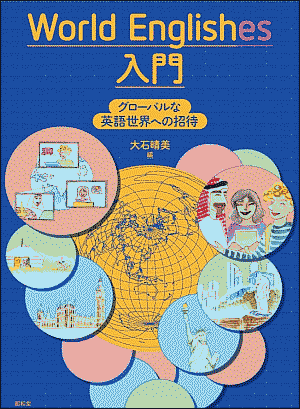
・ 大石 晴美(編) 『World Englishes 入門』 昭和堂,2023年.
2023-10-05 Thu
■ #5274. 19世紀のイングランド英語を研究する意義 [lmode][sociolinguistics][world_englishes][variety][standardisation][enl][esl]
19世紀のイングランド英語を研究するというのはどういうことか.確かに100年以上前の英語ではあるにせよ,歴史と呼ぶには新しい感じがするし,実際ほぼ普通に読むことができる.19世紀の英文学や英国文化に関心があるというのであれば分かるが,19世紀の英語そのものに関心が湧くというのはどういうことか.
先日,逝去された英語史の大家 Manfred Görlach は,上記のように評価されることが多い19世紀のイングランド英語に真っ向から立ち向かい,1999年に一冊の本を著わした.ずばり English in Nineteenth-Century England: An Introduction である.この本の冒頭の節は "Motivations for the present book" である.まず前口上を引用しよう (1) .
Interest in the history of English has recently focused on more modern periods than the traditionally favoured ones of OE and ME. However, whereas EModE is becoming a well-researched field, the investigation of the language after 1700 has been more patchy. The 18th century has, for various reasons, received more attention than the period between 1800 and 1900.
No comprehensive description of 19th-century English --- in particular that of England --- has ever been attempted. And yet such a study promises to yield important insights, for the following reasons:
そして19世紀のイングランド英語に注目すべき3つの理由が続く (1--5) .
(1) The sociolinguistic foundations of PDE were laid in a period when the population expanded tremendously, especially in the industrial urban centres . . . , when the standard form of the language (St E) spread from the limited number of 'refined' speakers in the 18th century to a considerable section of the Victorian middle classes, and when general education began to level speech forms to an extent that is impossible to imagine for earlier periods.
(2) Comparisons between varieties of English in England and overseas are likely to provide evidence of the drifting apart of the colonial Englishes in spite of the retarding influences of British administration, the schools, and the influence of the high prestige of London English on educated speakers world-wide. Moreover, a description of the BrE of the time is a necessary precondition for evaluating the British linguistic input in overseas Englishes --- in regions where English is a native language (= ENL), like the American West, Upper Canada, Australia and New Zealand, the Cape and Natal, and in the great number of varieties of English used as a second language (= ESL) in Africa and Asia.
(3) A comparison of English in England with standard languages on the continent may well permit interlinguistic insights into parallels and differences in development within the framework of an increasingly similar West European material culture. Such comparisons might also prompt new questions and the application of new methods in cases where it has proved fruitful to look at sociolinguistic conditions in one culture which have been neglected in another.
この3つの視点はざっくり次のような趣旨と読めるだろう.
(1) 20世紀以降のイングランド英語を生み出した土壌を知る
(2) 世界に拡散した ENL や ESL の種を知る
(3) ヨーロッパの諸言語の社会言語学的事情と比較対照する
・ Görlach, Manfred. English in Nineteenth-Century England: An Introduction. Cambridge: CUP, 1999.
2023-08-12 Sat
■ #5220. OED と World Englishes [world_englishes][elf][oed][variety][notice]
先日 OED Online のインターフェースが突如変更された.見栄えや操作性が大幅に変化したため,毎日のように OED を利用している1ユーザーとしては,かなり戸惑ってしまったし,今もまだ戸惑っている.変更直後には大学院生などと「困ったねぇ」とやりとりしたほとだ.
ただ,新インターフェースに慣れるために,当てもなくサイトをブラウズしていたら,これまで気づかなかった記事なども多く発見できた.今回紹介する World Englishes の項もその1つだ.
OED は2028年に初版が出版されて100周年を迎える.その "The OED100 project" に向けて,OED は世界英語への関心を高めていくことに積極的な姿勢を示している.OED の編纂が始まった19世紀後半には,英語はまだ「真の世界語」ではなかった.しかし,現在では英語は17億5千万人の話者人口を擁する(British Council による調査)リンガフランカとして事実上の世界語となっている.とりわけこの100年を振り返ると,世界中で様々な英語の変種が出現し,標準化し,場合によっては規範化される世紀だった.OED も世界英語をめぐるこの急激な変化を反映し,様々な変種で一般的に使われている語句やその発音を積極的に採録していく姿勢を示している.
上記のページは,OED が World Englishes に関する情報を提供するハブとなっており,リンクの張られているコンテンツを読み視聴していくだけでも,おおいに勉強になるだろう.とりわけページ下部に配置されている,各変種の案内へのリンクは重要である.OED は着実に進化している!
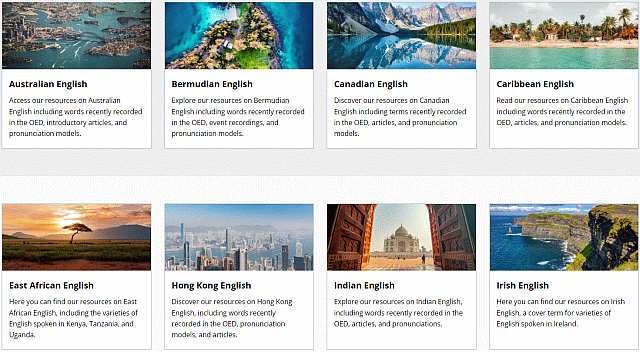
2023-02-21 Tue
■ #5048. heldio で朝カル講座の第4回(最終回)「英語の歴史と世界英語 --- 21世紀の英語のゆくえ」の予告編をお届けしています [asacul][notice][world_englishes][link][voicy][heldio][variety][dialectology][model_of_englishes]
おおよそ2週間後に迫ってきましたが,2023年3月4日(土)15:30--18:45に,朝日カルチャーセンター新宿教室にて全4回のシリーズ「英語の歴史と世界英語」の第4回(最終回)講座「21世紀の英語のゆくえ」が開講されます.昨日の Voicy 「英語の語源が身につくラジオ (heldio)」で,講座の予告編となる話しをしていますので,ぜひお聴きください.「#630. 世界英語の ENL, ESL, EFL モデルはもう古い? --- 3月4日,朝カル新宿教室で「英語の歴史と世界英語」のシリーズが完結します」です.
3月4日の講義は,教室での対面およびオンラインによるハイブリッドの講義となります.受講される方は,リアルタイム受講のほか1週間限定で講義動画を視聴できますので,ご都合のよい方法での参加をご検討ください.
シリーズのまとめの回という位置づけではありますが,実際には各回は独立しています.これまでの回を受講していない方にも,問題なく受講していただけますのでご安心ください.講座の詳細とお申し込みはこちらの公式ページよりお願い致します.
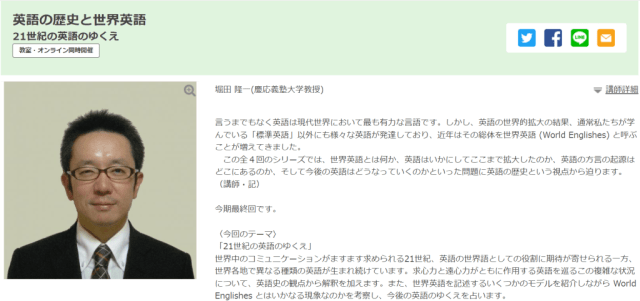
講座の概要は,公式ページからの引用となりますが以下の通りです.
「21世紀の英語のゆくえ」
世界中のコミュニケーションがますます求められる21世紀,英語の世界語としての役割に期待が寄せられる一方,世界各地で異なる種類の英語が生まれ続けています.求心力と遠心力がともに作用する英語を巡るこの複雑な状況について,英語史の観点から解釈を加えます.また,世界英語を記述するいくつかのモデルを紹介しながら World Englishes とはいかなる現象なのかを考察し,今後の英語のゆくえを占います.
シリーズの第1回から第3回までの講座と関連する話題は,hellog や heldio でも取り上げてきました.次回第4回に向けて復習・予習ともなりますので,以下のバックナンバーを参考までにどうぞ.なお,新年度からは,同じ朝日カルチャーセンター新宿教室にて英語史に関する新シリーズを開始する予定です.
[ 第1回 世界英語入門 (2022年6月11日)]
・ hellog 「#4775. 講座「英語の歴史と世界英語 --- 世界英語入門」のシリーズが始まります」 ([2022-05-24-1])
・ heldio 「#356. 世界英語入門 --- 朝カル新宿教室で「英語の歴史と世界英語」のシリーズが始まります」
・ heldio 「#378. 朝カルで「世界英語入門」を開講しました!」
[ 第2回 いかにして英語は拡大したのか (2022年8月6日)]
・ hellog 「#4813. 朝カル講座の第2回「英語の歴史と世界英語 --- いかにして英語は拡大したのか」のご案内」 ([2022-07-01-1])
・ heldio 「#393. 朝カル講座の第2回「英語の歴史と世界英語 --- いかにして英語は拡大したのか」」
[ 第3回 英米の英語方言 (2022年10月1日)]
・ hellog 「#4875. 朝カル講座の第3回「英語の歴史と世界英語 --- 英米の英語方言」のご案内」 ([2022-09-01-1])
・ heldio 「#454. 朝カル講座の第3回「英語の歴史と世界英語 --- 英米の英語方言」」
2022-11-19 Sat
■ #4954. 朝カル講座の第4回(最終回)「英語の歴史と世界英語 --- 21世紀の英語のゆくえ」のご案内 [asacul][notice][world_englishes][link][voicy][heldio][variety][dialectology][model_of_englishes]
2023年3月4日(土)15:30--18:45に,朝日カルチャーセンター新宿教室にて全4回のシリーズ「英語の歴史と世界英語」の第4回講座「21世紀の英語のゆくえ」を開講します.シリーズ最終回です.教室・オンライン同時開催で,受講された方は後日1週間限定のアーカイヴ動画も視聴できますので,ご都合に合う方法でご参加ください.シリーズものではありますが各回は独立していますので,第1回から第3回までの講座を受講していない方も安心してご参加いただけます.講座の詳細とお申し込みはこちらの公式ページよりどうぞ.

講座そのものは4ヶ月近く先なのですが,昨日11月18日(金)の朝日新聞夕刊4面にて以下のように紹介されましたので,hellog でもこのタイミングでご案内(第1弾)します.
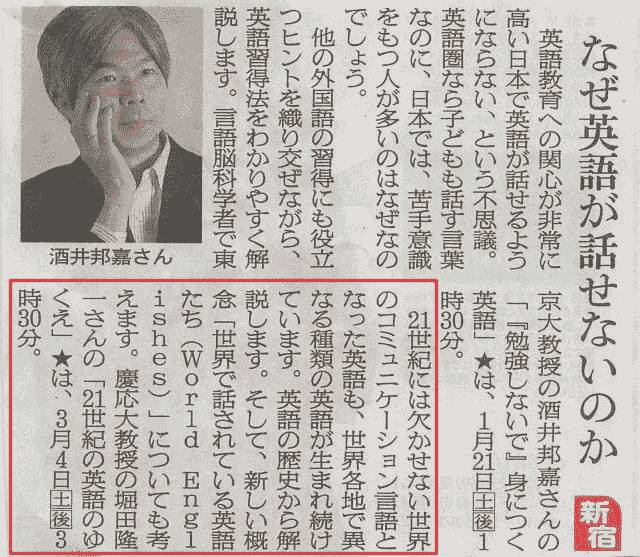
講座の概要は,公式ページからの引用となりますが以下の通りです.
「21世紀の英語のゆくえ」
世界中のコミュニケーションがますます求められる21世紀,英語の世界語としての役割に期待が寄せられる一方,世界各地で異なる種類の英語が生まれ続けています.求心力と遠心力がともに作用する英語を巡るこの複雑な状況について,英語史の観点から解釈を加えます.また,世界英語を記述するいくつかのモデルを紹介しながら World Englishes とはいかなる現象なのかを考察し,今後の英語のゆくえを占います.
シリーズの第1回から第3回までの講座と関連する話題は,hellog や heldio でも取り上げてきました.次回第4回に向けて復習・予習ともなりますので,以下のバックナンバーも参考までにどうぞ.
[ 第1回 世界英語入門 (2022年6月11日)]
・ hellog 「#4775. 講座「英語の歴史と世界英語 --- 世界英語入門」のシリーズが始まります」 ([2022-05-24-1])
・ heldio 「#356. 世界英語入門 --- 朝カル新宿教室で「英語の歴史と世界英語」のシリーズが始まります」
・ heldio 「#378. 朝カルで「世界英語入門」を開講しました!」
[ 第2回 いかにして英語は拡大したのか (2022年8月6日)]
・ hellog 「#4813. 朝カル講座の第2回「英語の歴史と世界英語 --- いかにして英語は拡大したのか」のご案内」 ([2022-07-01-1])
・ heldio 「#393. 朝カル講座の第2回「英語の歴史と世界英語 --- いかにして英語は拡大したのか」」
[ 第3回 英米の英語方言 (2022年10月1日)]
・ hellog 「#4875. 朝カル講座の第3回「英語の歴史と世界英語 --- 英米の英語方言」のご案内」 ([2022-09-01-1])
・ heldio 「#454. 朝カル講座の第3回「英語の歴史と世界英語 --- 英米の英語方言」」
2022-11-17 Thu
■ #4952. 言語における威信 (prestige) とは? [prestige][terminology][sociolinguistics][sobokunagimon][variety][loan_word][french][latin]
社会言語学のキーワードである威信 (prestige) については,hellog でもタグとして設定しており,当たり前のように用いてきたが,改めて定義を確認してみようと思い立った.私は日常的には「エラさ」「カッコよさ」と超訳しているのだが,念のために正式な定義が欲しいと思った次第.
ところが,手元の社会言語学系の用語集などを漁り始めたところ,意外と見出しが立っていない.数分かかって,最初に引っかかったのが Lyle and Mixco の歴史言語学の用語集だった.数分を犠牲にした後のありがたみがあるので,こちらを一字一句引用することにしよう (155--56) .
prestige In sociolinguistics, the positive value judgment or high status accorded certain languages, certain varieties and certain variables favored over other less prestigious languages, varieties or variables. The prestige accorded linguistic variables is a factor that often leads to linguistic change. The prestige of a language can lead speakers of other languages to take loanwords from it or to adopt the language outright in language shift. Overt prestige is the most common; it is the positive or high value attributed to variables, varieties and languages typically widely recognized as prestigious among the speakers of a language. The prestige varieties and variables are usually those recognized as belonging to the standard language or that are used by highly educated or influential people. Covert prestige refers to the positive evaluation given to non-standard, low-status or 'incorrect' forms of speech by some speakers, a hidden or unacknowledged prestige for non-standard variables that leads speakers to continue using them and sometimes causes such forms to spread to other speakers.
なるほど,prestige とは,言語変種 (variety) についていわれる場合と,言語変項 (variable) についていわれる場合があるというのは,確かにそうだ.言語変種についていわれる prestige はマクロ的な概念であり,言語交替 (language_shift) や語彙借用の方向性に関与する.一方,言語変項についていわれる prestige はミクロ的であり,個々の言語変化の原動力となり得る要因である.この2つは概念上区別しておく必要があるだろう.
考えてみれば prestige という語自体が,フランス語風に /prɛsˈtiːʒ/ と発音され,prestigious な響きがある.実際,フランス語 prestige を借りたもので,このフランス単語自体はラテン語の praest(r)īgia(illusion) に由来する.語自体の英語での初出は,17世紀の辞書編纂家 T. Blount が Glossographia で,そこでの語義は「威信」ではなく原義の「錯覚」である ("deceits, impostures, delusions, cousening tricks") .「威信」という語義で最初に用いられたのは,ずっと遅く1829年のことである.
prestige のもとであるラテン単語の原義は物理的に「強い締め付け」ほどであり,そこから認知的・精神的な「幻惑;錯覚」を経て,最後に「威信」となった.拘束的で抑圧的な力を想起させる意味変化といってよく,この経緯自体が意味深長である.
・ Campbell, Lyle and Mauricio J. Mixco, eds. A Glossary of Historical Linguistics. Salt Lake City: U of Utah P, 2007.
2022-09-29 Thu
■ #4903. 世界英語は伝統的英米諸方言の延長線上にある [world_englishes][dialectology][bre][ame][variety][map][ewave]
昨今,世界英語 (World Englishes) について考察したり議論したりする機会が多くなってきた.私は英語史の立場から,世界英語現象を伝統的英米諸方言の話題の延長線上にあるものとしてとらえている.平たくいえば,世界英語は英語方言という広いテーマの1つであり,その点では英語史上のイギリス方言やアメリカ方言の話題と異ならない,という立場だ.単に方言展開の舞台が数カ国という狭い空間から世界という広い空間に拡大しただけで質的な違いはない,とみている.
もちろんこれは見方の問題であるし,すべてが見方次第である.世界英語の多様性と,例えばイギリス英語の多様性を比べるとき,相違点を列挙していくことはたやすい.
1. 世界英語にあっては,諸方言が展開する舞台は世界全体であり,狭いブリテン諸島のみとはわけが違う.
2. 世界英語にあっては,諸方言がいかにして発達してきたか,その方法や経路が明らかに多様である.
3. 世界英語にあっては,言語接触の果たす役割が段違いに大きい.
4. 世界英語にあっては,母語方言のみならず非母語方言も考慮に入れる必要がある.
5. 世界英語は20世紀後半から21世紀にかけての現代的な話題である.
5点のみ挙げたが,他にもいろいろと指摘することができるだろう.上記5点はそれぞれ興味深い論点ではあるが,異議を唱える(あるいは少なくとも議論の再考を促す)ことも同じくらい容易である.
1'. イギリス英語にあっては,諸方言が展開する舞台はブリテン諸島全体であり,狭いイングランドのみとはわけが違う.
2'. イギリスにあっては,諸方言がいかにして発達してきたか,その方法や経路が明らかに多様である.(古英語から現代英語に至るまでイングランド諸方言の発達を巡って未解決の問題が山積している.方言発達の方法や経路は十分に複雑で多様である.)
3'. イギリス英語にあっては,言語接触の果たす役割が大きい.(世界英語における言語接触の果たす役割が本当に「段違いに」大きいかどうかは慎重な議論を要する.というのは,そもそも英語史は言語接触の歴史といってもよいほどだからだ.)
4'. イギリス英語にあっては,母語方言のみならず非母語方言も考慮に入れる必要がある.(ウェールズやアイルランドの英語方言は,非母語方言として始まり発展してきた.)
5'. イギリス英語は20世紀後半から21世紀にかけての現代的な話題で「も」ある.(もちろん,それ以前の話題でもあったが.)
議論する上で2つの問題を切り分ける必要がない,と主張しているわけではない.見方を変えれば切り分けずに議論することもできるということを,英語史の立場から述べておきたい次第.
2022-09-28 Wed
■ #4902. eWAVE 3.0 の紹介 --- 世界英語の言語的特徴を格納したデータベース [ewave][world_englishes][variety]
先日の khelf-conference-2022 (=ゼミ合宿)で,専修大学の菊地翔太先生に eWAVE 講習会@khelf-conference-2022を開いていただきました.実践的にご紹介いただき,たいへん勉強になりました(菊地先生,ありがとうございます!).
eWAVE 3.0 (= The Electronic World Atlas of Varieties of English) は,世界中の英語変種の言語学的特徴が格納されているデータベースです.現在までに77の変種に関する言語学的(主に形態統語的)情報,および背景情報が整理されて提供されています.言語データの提供源は,各変種についての記述的研究,コーパス,そして84人の専門家のインフォーマントです.
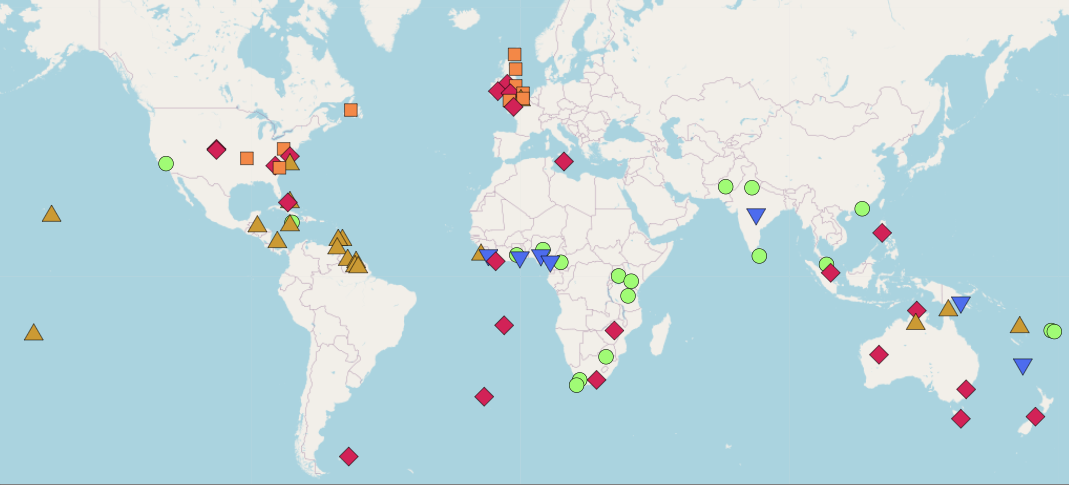
変種間の比較対照のために設定されている言語項目は235件の形態統語的特徴で,Attestation, Pervasiveness, Area の3つのパラメータによりソートすることができ,結果を容易に世界地図上にプロットできる仕様となっています.
eWAVE のイントロによると,このデータベースを利用することで,次のような問いに答えを出すことができるとのことです.
・ Which features are most/least widespread across varieties of English worldwide?
・ How many varieties of English worldwide share feature X?
・ Is feature X restricted to or characteristic of a particular part of the English-speaking world?
・ Is feature X restricted to or characteristic of a particular group of varieties?
・ Does variety A have feature X?
・ In which area of grammar does variety A differ most from variety B?
世界英語 (world_englishes) を研究する上で,間違いなく重要なツールとなります.一方,使用するに当たって注意すべき点もあります.詳細や関連情報については,eWAVE 講習会@khelf-conference-2022の資料が有用です.ぜひじっくり学んでみてください.
eWAVE の編纂者の1人 Kortmann については,本ブログでも世界英語の話題と関連して,以下で触れていますので,合わせてどうぞ.
・ 「#4509. "angloversals" --- 世界英語にみられる「普遍的な」言語項目」 ([2021-08-31-1])
・ 「#4763. 多くの世界英語変種にみられる非標準的な言語項目トップ11」 ([2022-05-12-1])
・ Kortmann, Bernd, Kerstin Lunkenheimer, and Katharina Ehret, eds. The Electronic World Atlas of Varieties of English. Zenodo, 2020. Available online at http://ewave-atlas.org.
2022-09-13 Tue
■ #4887. 『言語の標準化を考える』の編者が綴る紹介文,第1弾(堀田隆一) [gengo_no_hyojunka][contrastive_language_history][notice][hellog_entry_set][standardisation][variety][genbunicchi][notice]
近刊書『言語の標準化を考える --- 日中英独仏「対照言語史」の試み』(大修館,2022年)について,本ブログや Voicy 「英語の語源が身につくラジオ (heldio)」で,様々に紹介してきました(まとめてこちらの記事セットからどうぞ).

本書は,5言語の標準化の歴史を共通のテーマに据えて「対照言語史」 (contrastive_language_history) という新たなアプローチを提示し,さらに脚注で著者どうしがツッコミ合うという特殊なレイアウトを通じて活発な討論を再現しようと試みました.この企てが成功しているかどうかは,読者の皆さんの判断に委ねるほかありません.
このたび高田博行氏(ドイツ語史),田中牧郎氏(日本語史),堀田隆一(英語史)の編者3名が話し合い,各々の立場から本書を紹介する文章を作成し公開しようという話しになりました.そして,公開の場は,お二人の許可もいただき,この「hellog~英語史ブログ」にしようと決まりました.結果として,英語(史)に関心をもって本ブログをお読みの皆さんを意識した文章になったと思います.
今日はその第1弾として,まず堀田の文章をお届けします.
私たちが学習・教育の対象としている「英語」は通常「標準英語」を指す.世界で用いられている英語にはアメリカ英語,イギリス英語,インド英語をはじめ様々な種類があるが,学習・教育のターゲットとしているのは最も汎用性の高い「標準英語」だろうという感覚がある.しかし,「標準英語」とは何なのだろうか.実は皆を満足させる「標準英語」の定義はない.比較的よく参照される定義に従うと,外国語として学習・教育の対象とされている類いの英語を指すものとある.明らかに循環論法に陥っている.
つまり,私たちは「標準英語」というターゲットが何なのかを明確に理解しないままに,そこに突き進んでいることになる.とはいえ「標準英語」という概念・用語は便利すぎて,今さら捨てることはできない.私たちは「標準英語」をだましだまし理解し,受け入れているようなのである.
実のところ,筆者は「標準英語」を何となくの理解で受け入れておくという立場に賛成である.それは歴史的にも「揺れ動くターゲット」だったし,静的な存在として定義できるようなものではないと見ているからだ.「標準英語」は1600年ほどの英語の歴史のなかで揺れてきたし,それ自身が消失と再生を繰り返してきた.そして,英語が世界化した21世紀の現在,「標準英語」は過去にもまして揺れ動くターゲットと化しているように思われるのである.
歴史を通じて「標準英語」が揺れ動くターゲットだったことは,本書の第6章と第7章で明らかにされる.第6章「英語史における「標準化サイクル」」(堀田隆一)では,英語が歴史を通じて標準化と脱標準化のサイクルを繰り返してきたこと,標準英語の存在それ自体が不安定だったことが説かれる.さらに同章では,近現代英語期にかけての標準化の様相が,日本語標準化の1側面である明治期の言文一致の様相と比較し得ることが指摘される.これは,言語や社会や時代が異なっていても,標準化という過程には何か共通点があるのではないか,という問いにつながる.
第7章「英語標準化の諸相――20世紀以降を中心に」(寺澤盾)では,まず標準化を念頭に置いた英語史の時代区分が導入され,続いて「標準化」が「統一化」「規範化」「通用化」の3種類に分類され,最後に20世紀以降の標準化の動きが概説される.過去の標準化では「統一化」「規範化」の色彩が濃かった一方,20世紀以降には「通用化」の流れが顕著となってきているとして,現代の英語標準化の特徴が浮き彫りにされる.
本書は「対照言語史」という方法論を謳って日中英独仏5言語の標準化史をたどっている.英語以外の言語の標準化の歴史を眺めても「標準語」は常に揺れ動くターゲットだったことが繰り返し確認できる.各言語史を専門とする著者たちが,脚注を利用して紙上で「ツッコミ」合いをしている様子は,各自が動きながら揺れ動くターゲットを射撃しているかのように見え,一種のカオスである.しかし,知的刺激に満ちた心地よいカオスである.
冒頭の「標準英語」の問題に戻ろう.「標準英語」が揺れ動くものであれば,標準英語とは何かという静的な問いを発することは妥当ではないだろう.むしろ,英語の標準化という動的な側面に注目するほうが有意義そうだ.英語学習・教育の真のターゲットは何なのかについて再考を促す一冊となれば,編著者の一人として喜びである.
明日,明後日も編者からの紹介文を掲載します.
2022-09-01 Thu
■ #4875. 朝カル講座の第3回「英語の歴史と世界英語 --- 英米の英語方言」のご案内 [asacul][notice][world_englishes][link][voicy][heldio][variety][ame][bre][me_dialect][dialectology]
ちょうど1ヶ月後のことになりますが,2022年10月1日(土)15:30--18:45に,朝日カルチャーセンター新宿教室にて全4回のシリーズ「英語の歴史と世界英語」の第3回講座「英米の英語方言」を開講します.対面・オンラインのハイブリッド講座として開講される予定です.ご関心のある方は,ぜひ参加をご検討ください.シリーズ講座ではありますが,毎回独立した講座となっていますので,第1回,第2回に参加されていない方もご安心ください.詳細とお申し込みはこちらの公式ページよりどうぞ.第3回講座の概要は以下の通りです.
現代の「世界英語」を構成するさまざまな変種は,英語の諸方言とみることができます.実際,英語の歴史において方言は常に多様な形で存在し続けてきており,決して現代に特有の現象ではありません.アメリカ英語にも多くの方言が,イギリス英語にはさらに多くの方言がありましたし,今もあります.つまり「世界英語」は,歴史的な英語諸方言の延長線上にある現象なのです.英米方言,および諸方言の対極にある標準語の役割にも注目します.
21世紀の世界英語 (World Englishes) も,英語史を通じて存在し続けてきた英語諸方言も,様々な英語の集合体という点では変わりありません.多様性が展開する舞台こそ,狭いブリテン島から広い地球へと拡がってきましたが,本質的に新しいことが生じているわけではありません.現代世界で英語に生じている出来事は,歴史的には必ずしも特別なものではないのです.
とはいえ,もちろんすべてが同じわけでもありません.そのような異同を考えることで,現代の世界英語現象の特殊性をも浮き彫りにしていきたいと思います.かつての英語の多様性を振り返るに当たって,2大英語国である英米の諸方言に焦点を当てます.
第3回講座についてもう少し詳しく知りたい方は,予告編として Voicy 「英語の語源が身につくラジオ (heldio)」を通じて「#454. 朝カル講座の第3回「英語の歴史と世界英語 --- 英米の英語方言」」を配信していますので,そちらをお聴きください.
シリーズ講座の第1回,第2回については,以下の hellog や heldio でも取り上げています.こちらも参考までにどうぞ.
・ hellog 「#4775. 講座「英語の歴史と世界英語 --- 世界英語入門」のシリーズが始まります」 ([2022-05-24-1])
・ heldio 「#356. 世界英語入門 --- 朝カル新宿教室で「英語の歴史と世界英語」のシリーズが始まります」 (2022/05/22)
・ heldio 「#378. 朝カルで「世界英語入門」を開講しました!」 (2022/06/13)
・ hellog 「#4813. 朝カル講座の第2回「英語の歴史と世界英語 --- いかにして英語は拡大したのか」のご案内」 ([2022-07-01-1])
・ heldio 「#393. 朝カル講座の第2回「英語の歴史と世界英語 --- いかにして英語は拡大したのか」」 (2022/06/28)
2022-07-30 Sat
■ #4842. 英語は歴史の始まりからすでに混種言語だった? [variety][dialect][germanic][oe][jute][history][oe_dialect][anglo-saxon][dialect_contact][dialect_mixture]
1860年代に出版された Marsh による英語史講義録をパラパラめくっている.Marsh によれば,アングロサクソン語,すなわち古英語は,大陸からブリテン島に持ち込まれた諸方言の混合体であり,その意味においてブリテン島に "aboriginal" な言語とは言えないものの "indigenous" な言語ではあると述べている.言語としては混合体ならではの "diversity" を示し,"obscure", "confused", "imperfect", "anomalous", "irregular" であるという.以下,関連する箇所を引用する.
§15. It has been already shown that the Anglo-Saxon conquerors consisted of several tribes. The border land of the Scandinavian and Teutonic races, whence the Anglo-Saxon invaders emigrated, has always been remarkable for the number of its local dialects. The Friesian, which bears a closer resemblance than any other linguistic group to the English, differs so much in different localities, that the dialects of Friesian parishes, separated only by a narrow arm of the sea, are often quite unintelligible to the inhabitants of each other. Moreover, the Anglo-Saxon language itself supplies internal evidence that there was a great commingling of nations in the invaders of our island. This language, in its obscure etymology, its confused and imperfect inflexions, and its anomalous and irregular syntax, appears to me to furnish abundant proof of a diversity, not of a unity, of origin. It has not what is considered the distinctive character of a modern, so much as of a mixed and ill-assimilated speech, and its relations to the various ingredients of which it is composed are just those of the present English to its own heterogeneous sources. It borrowed roots, and dropped endings, appropriated syntactical combinations without the inflexions which made them logical, and had not yet acquired a consistent and harmonious structure when the Norman conquest arrested its development, and imposed upon it, or, perhaps we should say, gave a new stimulus to, the tendencies which have resulted in the formation of modern English. There is no proof that Anglo-Saxon was ever spoken anywhere but on the soil of Great Britain; for the 'Heliand,' and other remains of old Saxon, are not Anglo-Saxon, and I think it must be regarded, not as a language which the colonists, or any of them, brought with them from the Continent, but as a new speech resulting from the fusion of many separate elements. It is, therefore, indigenous, if not aboriginal, and as exclusively local and national in its character as English itself.
古英語の生成に関する Marsh のこの洞察は優れていると思う.しかし,評価するにあたり,この講義録がイギリス帝国の絶頂期に出版されたという時代背景は念頭に置いておくべきだろう.引用の最後にある "exclusively local and national in its character as English itself" も,その文脈で解釈する必要があるように思われる.
古英語の生成については「#389. Angles, Saxons, and Jutes の故地と移住先」 ([2010-05-21-1]),「#2868. いかにして古英語諸方言が生まれたか」 ([2017-03-04-1]),「#4439. 古英語は混合方言として始まった?」 ([2021-06-22-1]) の記事も参照.
・ Marsh, George Perkins. Lectures on the English Language: Edited with Additional Lectures and Notes. Ed. William Smith. 4th ed. London: John Murray, 1866. Rpt. HardPress, 2012.
2022-07-27 Wed
■ #4839. 英語標準化の様相は1900年を境に変わった [gengo_no_hyojunka][standardisation][notice][variety][world_englishes]
hellog では,この5月に大修館書店より出版された『言語の標準化を考える --- 日中英独仏「対照言語史」の試み』(大修館,2022年)について,たびたび広報しています.
今度の日曜日,7月31日(日)11:00--12:00 には編者3人の対談が,Voicy にて生放送される予定です.事前の質問なども受け付けていますので,こちらの Google Forms よりお寄せください.詳細は「#4836. 7月31日(日)11:00--12:00 に生放送!『言語の標準化を考える』をめぐる編者鼎談第2弾」 ([2022-07-24-1]) をご覧ください.

本書では英語の標準化 (standardisation) の歴史を,6章と7章にわたって詳述しています.とりわけ7章では「英語標準化の諸相―20世紀以降を中心に」と題して,20--21世紀の英語の「標準化」,実質的には英語の世界的な「通用化」という私たちにとって直接関わりのある話題が議論されています.執筆者は寺澤盾先生(青山学院大学)です.
この章の前半では,Norman Blake に依拠し,標準化を念頭に置いた英語史の流れが概説されます.そして,真骨頂の後半では,1900年以降の英語の標準化について,とりわけ現代と未来を見据えた英語のあり方について,Basic English, Special English, Globish, Nuclear English, World Standard Spoken English という具体的な「変種」を参照しながら議論がなされます.
寺澤先生の議論の趣旨は,目安として1900年を境に英語の標準化のあり方が変容したということです.この年代以前の標準化は,書き言葉の「統一化」「規範化」というトップダウンの標準化が基本でした.一方,この年代以降は,話し言葉の「通用化」というボトムアップの標準化が進んできているということです.
私自身が執筆した6章「英語史における「標準化サイクル」」と合わせて,今や世界的な言語となった英語の,広い意味での「標準化」について,様々な観点から議論が活性化してくるとおもしろいですね.
・ 寺澤 盾 「英語標準化の諸相―20世紀以降を中心に」『言語の標準化を考える --- 日中英独仏「対照言語史」の試み』高田 博行・田中 牧郎・堀田 隆一(編著),大修館,2022年.
2022-06-21 Tue
■ #4803. 「英語」「英語複合体」「諸英語」 [terminology][world_englishes][elf][variety][model_of_englishes]
世界英語の問題と関連して,Rubdy and Saraceni が Tom McArthur にインタビューした記事を読んだ.2006年の議論なので,今となっては古いといえば古いと思われるかもしれないが,McArthur の問題意識は予言的な鋭さをもっており,現代の英語論においても十分に参考になる.
ポイントは,英語という言語の対象を (1) 「英語」 (the English language),(2) 「英語複合体」 ('the English language complex'),(3) 「諸英語」 ('the Englishes', 'the English languages') の3つの層で考えるのがよいのではないかという提案だ.Rubdy and Saraceni (29) から,インタビューの問答を聞いてみよう.
Q9 In some countries of Asia and Africa, English has become 'nativized' and begun to be considered an Asian or African language, and not one that is owned exclusively by any one speech community. For this reason some sociolinguists are of the view that it may be more realistic to recognize a plurality of standards. Given this view, if 'the English language' needs to be pluralized into 'the English languages', what does ELT stand for?
A9 I'm glad you raised this one. It fits my own observations over many years, as summed up in The English Languages (Cambridge, 1998). English is such an immense language that for me it has been essential to have at least three models. First there is English as a 'conventional' language ('the English language'), useful on a day-to-day basis but for me only the starting point for the second model ('the English language complex'), which has many varyingly distinct subentities, and finally to the third model of English as a continuum of recognizably distinct languages ('the Englishes', 'the English languages'), dominated by the educated standards of various countries that provide basis (particularly through the norms of the US and UK) of a 'World Standard English'. Most learners have no interest in all of this. If, as I hope, they are lucky, they will learn an English appropriate to their needs and situation, and expand (perhaps creatively) as and when they feel the need.
私たちが英語という言語について論じるときに,この3層のいずれの層の英語を問題にしているのかが重要である.議論の参加者の間で前提としている層がズレていると,英語を巡る議論も不毛になるからだ.それくらい英語論は精妙になってきているとも言えるのである.
私は,大学の通常の英語の授業で教えるときには (1) を念頭に置いている.しかし,英語史・英語学の授業ではもう少し英語変種の細分化の意識が高くなり,その全体を (2) としてとらえていることが多いと思う.一方,意識的に「世界英語」を論じる専門的な文脈では,当然ながら (3) の捉え方を前提とすることになる.
これらは分析の粒度こそ互いに大きく異なるにもかかわらず,いずれもラフに「英語」や English として言及されがちなのもまた常なのである.だから英語を論じるのは難しいのだ.
McArthur の英語観については,hellog でも「#427. 英語話者の泡ぶくモデル」 ([2010-06-28-1]),「#4501. 世界の英語変種の整理法 --- McArthur の "Hub-and-Spokes" モデル」 ([2021-08-23-1]) で取り上げてきた.そちらも要参照.
・ Rubdy, Rani, and Mario Saraceni. "An Interview with Tom McArthur." English in the World: Global Rules, Global Roles. Ed. Rani Rubdy and Mario Saraceni. London: Continuum, 2006. 21--31.
・ McArthur, Tom. "The English Languages?" English Today 11 (1987): 9--11.
・ McArthur, Tom. "English in Tiers." English Today 23 (1990): 15--20.
・ McArthur, Tom. "Models of English." English Today 32 (1991): 12--21.
・ McArthur, Tom, ed. The Oxford Companion to the English Language. Oxford: OUP, 1992.
・ McArthur, Tom. The English Languages. Cambridge: CUP, 1998. 94.
2022-05-26 Thu
■ #4777. 「標準」英語の意味の変遷 --- 「皆に通じる英語」から「えらい英語へ」 [standardisation][prestige][sociolinguistics][variety][swift]
昨日の記事「#4776. 初の対照言語史の本が出版されました 『言語の標準化を考える --- 日中英独仏「対照言語史」の試み』」 ([2022-05-25-1]) で紹介した編著書では,英語の標準化について2本の論考が掲載されている.1つは寺澤盾先生(青山学院大学)による「第7章 英語標準化の諸相 --- 20世紀以降を中心に」で,もう1つは拙論の「第6章 英語史における『標準化サイクル』」である.
そもそも「標準英語」 (Standard English) とは何かという根本的な問題については私もいろいろ考え続けてきたが,いまだによく分かっていない.以下の記事などは,その悩みの足跡ともいえる.
・ 「#1396. "Standard English" とは何か」 ([2013-02-21-1])
・ 「#3499. "Standard English" と "General English"」 ([2018-11-25-1])
・ 「#1237. 標準英語のイデオロギーと英語の標準化」 ([2012-09-15-1])
・ 「#3232. 理想化された抽象的な変種としての標準○○語」 ([2018-03-03-1])
・ 「#4277. 標準語とは優れた言語のことではなく社会的な取り決めのことである」 ([2021-01-11-1])
・ 「#1275. 標準英語の発生と社会・経済」 ([2012-10-23-1])
・ 「#1228. 英語史における標準英語の発展と確立を巡って」 ([2012-09-06-1])
本来,標準英語とは「皆に通じる英語」ほどを意味する用語から始まったと思われるが,歴史の過程でいつのまにか,威信 (prestige) が宿り社会言語学的な手垢のついた「えらい英語」という地位にすり替わってしまったかのように思われる.「標準」の意味が,中立的なものから底意のあるものに変容してしまったのではないか.おそらく,この変容の生じた時期の中心は,後期近代英語期から現代英語期にかけてだろう.
この変容を,Horobin (73--74) は Jonathan Swift (1667--1745) から Henry Cecil Wyld (1870--1945) への流れのなかに見て取っている.
The application of the adjective standard to refer to language is first recorded in the eighteenth century, a development of its earlier use to refer to classical literature. A desire to associate English literature with the Classics prompted a wish to see the English language achieve a standard form. This ambition was most clearly articulated by Jonathan Swift: 'But the English Tongue is not arrived to such a degree of Perfection, as to make us apprehend any Thoughts of its Decay; and if it were once refined to a certain Standard, perhaps there might be Ways found out to fix it forever' (A Proposal for Correcting, Improving and Ascertaining the English Tongue, 1712). By the nineteenth century, the term Standard English referred specifically to a prestige variety, spoken only by the upper classes, yet viewed as a benchmark against which the majority of native English speakers were measured and accused of using their language incorrectly.
The identification of Standard English with the elite classes was overtly drawn by H. C. Wyld, one of the most influential academic linguists of the first half of the twentieth century. Despite embarking on his philological career as a neutral observer, for whom one variety was just as valuable as another, Wyld's later work clearly identified Standard English as the sole acceptable form of usage: 'It may be called Good English, Well-bred English, Upper-class English.' These applications of the phrase Standard English reveal a telling shift from the sense of standard signalling 'in general use' (as in the phrase 'standard issue') to the sense of a level of quality (as in the phrase 'to a high standard').
From this we may discern that Standard English is a relatively recent phenomenon, which grew out of an eighteenth-century anxiety about the status of English, and which prompted a concern for the codification and 'ascertaining', or fixing, of English. Before the eighteenth century, dialect variation was the norm, both in speech and in writing.
Horobin は他の論考においてもそうなのだが,Wyld 批判の論調が色濃い.この辺りは本当におもしろいなぁと思う.
・ Horobin, Simon. How English Became English: A Short History of a Global Language. Oxford: OUP, 2016.
2022-05-24 Tue
■ #4775. 講座「英語の歴史と世界英語 --- 世界英語入門」のシリーズが始まります [asacul][notice][history][link][world_englishes][variety]
来たる6月11日(土)の 15:30--18:45 の初回を皮切りに,朝日カルチャーセンター新宿教室にて「英語の歴史と世界英語 --- 世界英語入門」と題するシリーズ講座が始まります.全4回のシリーズで,今をときめく「世界英語」 (world_englishes) をテーマに英語史の観点からお話ししていく予定です.
ご関心のある方は,ぜひご参加ください.講座紹介および参加お申し込みはこちらからどうぞ.対面のほかオンラインでの参加も選べます.また,1週間のレコーディング限定配信も予定されていますので,都合のよい方法でご参加いただけます.
シリーズ全体の概要を以下に転記しておきます.
言うまでもなく英語は現代世界において最も有力な言語です.しかし,英語の世界的拡大の結果,通常私たちが学んでいる「標準英語」以外にも様々な英語が発達しており,近年はその総体を世界英語 (World Englishes) と呼ぶことが増えてきました.
この全4回のシリーズでは,世界英語とは何か,英語はいかにしてここまで拡大したのか,英語の方言の起源はどこにあるのか,そして今後の英語はどうなっていくのかといった問題に英語の歴史という視点から迫ります.
全4回のタイトル(予定)は以下の通りです.
・ 第1回 世界英語入門(6月11日)
・ 第2回 いかにして英語は拡大したのか(8月6日)
・ 第3回 英米の英語方言(未定)
・ 第4回 21世紀の英語のゆくえ(未定)
初回となる「世界英語入門」でお話しする内容はおよそ次の通りとなる見込みです.
通常私たちが学んでいる「標準英語」は英米英語を基盤としていますが,現在世界中で用いられている英語はインド英語,ナイジェリア英語,ジャマイカ英語などと実に多様です.近年,これらは「世界英語」(英語では複数形の "World Englishes")として呼ばれることも多くなってきました.本講義では,この「世界英語」現象とは何なのかを導入するとともに,なぜ,どのようにこの現象が生じているのかについて,主に英語の歴史の観点から議論します.
本シリーズの案内は,hellog の姉妹版・音声版の Voicy 「英語の語源が身につくラジオ (heldio)」 でも配信していますので,ぜひそちらもお聴きください.
世界英語と関連して,以下の hellog 記事,heldio 放送もどうぞ.
・ hellog 「#4558. 英語史と世界英語」 ([2021-10-19-1])
・ hellog 「#4730. World Englishes の学び始めに何冊か本を紹介」 ([2022-04-09-1])
・ heldio 「#141. 対談 英語史 X 国際英語」(khelf(慶應英語史フォーラム)顧問である泉類尚貴氏との対談)
・ heldio 「#173. 立命館大学,岡本広毅先生との対談:国際英語とは何か?」
・ heldio 「#314. 唐澤一友先生との対談 今なぜ世界英語への関心が高まっているのか?」
皆様の本シリーズへの参加をお待ちしています!
2022-05-12 Thu
■ #4763. 多くの世界英語変種にみられる非標準的な言語項目トップ11 [world_englishes][typology][variety]
「#4509. "angloversals" --- 世界英語にみられる「普遍的な」言語項目」 ([2021-08-31-1]) で "angloversals" という用語・概念に触れた.世界の英語変種を見渡すと,歴史的,地理的に直接の関係がなさそうな変種間に,よく似た言語項目(とりわけ非標準的な言語項目)が共通して観察されることがある.いずれも広い意味で「英語」の仲間なので,そういうこともあるだろうと思われるかもしれないが,項目のなかには9割以上の英語変種に確認されるという,ユニバーサルに近いものもある.これが angloversals と呼ばれるものだ.
Kortmann は,世界の76の英語変種を調査し,多くの変種に共有されている angloversals のトップ11をはじき出した.いずれも標準的で規範的な文法としてはダメとされる形態統語的な項目である.Kortmann のランキング表 (639--40) を,見やすいように改変して以下に示す.左欄の "No." は調査上の整理番号,右欄の "AR" は "attestation rate" を指す.
| No. | Feature | Absent in | Total | AR worldwide |
|---|---|---|---|---|
| F229 | no inversion/no auxiliaries in main clause yes/no questions (You get the point?) | North, SE, AppE, ChcE, NigE, TP | 70 | 92% |
| F34 | forms or phrases for the second person plural pronoun other than you (e.g. youse, yinz, y'all, you guys, yufela) | O&SE, SE, TznE, UgE, HKE, FijiE, Saramaccan | 69 | 91% |
| F221 | adverbs other than degree modifiers have the same form as adjectives (Come quick!) | PakE, SLkE, HKE, FijiE, BelC, Bislama, TP | 69 | 91% |
| F7 | me instead of I in coordinate subjects (me and my brother) | FijiE, EMarC, Saramaccan, TorSC, PalmE, Bislama, Norf'k, TP | 68 | 89% |
| F159 | never as preverbal past tense negator (She never came this morning) | O&SE, ChcE, JamE, UgE, NigE, IndE, SLkE, EMarC, Saramaccan, Sranan, RRC, Bislama, TP | 63 | 83% |
| F154 | multiple negation/negative concord (He won't do no harm) | NigE, TznE, PakE, SLkE, MalE, FijiE, RRC, TP, Bislama, GhP, NigP | 61 | 80% |
| F220 | degree modifier adverbs have the same form as adjectives (This is real healthy) | . . . | 60 | 79% |
| F147 | was for conditional were (if I was you) | . . . | 58 | 76% |
| F78 | double comparatives and superlatives (That's so much more easier to follow) | . . . | 56 | 74% |
| F172 | existential/presentational there's/there is/there was with plural subjects (There's three people in the garden) | . . . | 54 | 71% |
| F228 | no inversion/no auxiliaries in wh-questions (What you doing?) | . . . | 54 | 71% |
とてもおもしろいランキング表である.第2位につけている youse や you guys がここまで広く世界英語変種にみられるとは思っていなかった.一方,多重否定,if I was you,2重比較級・最上級などは,さもありなんという感想だ.私自身も使ったことがあるものとないものとがあるが,全体として馴染み深い言語項目にみえることが興味深い.
・ Kortmann, Bernd. "Global Variation in the Anglophone World." Chapter 29 of The Oxford Handbook of English Grammar. Ed. Bas Aarts, Jill Bowie and Gergana Popova. Oxford: OUP, 2020. 630--53.
2022-04-22 Fri
■ #4743. 新変種の形成のモデルをめぐって [sociolinguistics][variety][founder_principle]
「#4738. 南アフリカ英語の歴史に生じた "swamping"?」 ([2022-04-17-1]) で触れたように,近年,新変種の形成についての関心が高まってきており,様々な学説が登場している.
Millar (40--54) は,対立する3つの新変種形成モデルを念頭に,いくつかの新変種形成の事例を紹介している.Tristan da Cunha English (cf. 「#2311. Tristan da Cunha」 ([2015-08-25-1])), Falkland Islands English (cf. 「#3249. The Falkland Islands」 ([2018-03-20-1])), Newfoundland English (cf. 「#4490. イギリスの北米植民の第2弾と第3弾」 ([2021-08-12-1])), Glaswegian Scots, Milton Keynes and 'Estuary English', Scottish Standard English (cf. 「#1719. Scotland における英語の歴史」 ([2014-01-10-1])) である.その結果わかったことは,いずれの新変種形成モデルにも一長一短があり,事例によってうまく説明できたり,できなかったりするということだ.Millar (55) を引用する.
The formation of new varieties of a language does appear to follow set patterns, based in particular upon the original inputs derived from the linguistic backgrounds of early settlers. A number of scholars --- most notably Trudgill --- are convinced that it would be possible to predict the outcome of this mix from the proportion of different origins in the initial settlement. Others are unconvinced by this argument, in particular in relation to a 'mindless' application of proportions, without reference to personal and group identities and the shifting linguistic attitudes found in all societies. Nevertheless, analyses of this type are useful in making us think about both origins and evolutionary change.
Equally useful, but also suspect, are the concepts of founder effect and swamping. The primary issue with these explanations is that they are very effective in some contexts, but do not seem to have much effect elsewhere . . . . The fact that the two apparently antagonistic views are actually sometimes similar and may well work together under certain circumstances needs to be borne in mind. Whatever their full applicability, both are useful metaphors for how some parts of a population can affect the development of a new variety even when they are not in the majority.
お互いに対立するモデルというよりは,むしろ相補的にとらえるほうがよいのではないか,という提案と読んだ.
・ Millar, Robert McColl. Contact: The Interaction of Closely Related Linguistic Varieties and the History of English. Edinburgh: Edinburgh UP, 2016.
2022-04-17 Sun
■ #4738. 南アフリカ英語の歴史に生じた "swamping"? [sociolinguistics][south_africa][variety][founder_principle]
移民・植民による新しい変種はいかにして形成されるのか.これは近年の歴史社会言語学でおおいに注目されている問題である.Trudgill や Mufwene に代表される論客が様々な説を提唱してきた.初期の移民人口がいかなる比率でどのような変種を携えていたかといった人口統計学的要因が決定的に重要であるという見解もあれば,リーダー的な話者集団,すなわち "founder" が話している変種こそが,その後の変種の方向性を決めるという見解もある(後者については「#1841. AAVE の起源と founder principle」 ([2014-05-12-1]) を参照).
Millar (38--40) によると,また別の見解として "swamping" という過程が考え得るという.現在の南アフリカ英語の諸特徴は,初期の移民史を参照しても,うまく説明することができない.初期の移民史によって説明し得る諸特徴は,1850年代の新たな移民を契機に「水没」してしまい,現在まで痕跡を残していない,というのが "swamping" 説の主旨だ.
現在の南アフリカ英語には多分に東南イングランド英語の言語特徴が含まれるといわれるが,これは単純に移民史をたどるだけでは説明がつかないという.Millar (39) より引こう.
There is some evidence which suggests . . . that this South-Eastern English predominance does not represent well the history of the first English-speaking immigrants of the 1820s, when the Cape and its surrounding districts had newly been brought under British control. (English speakers would have been regular visitors to the Cape during the period of Dutch rule; they would have been unlikely to have made a lasting impression on the linguistic history of the region, however.) The settlers of the 1850s in KwaZulu-Natal may be more representative of the later speech patterns of South African English . . . . Practically all evidence for any local variety of English predating this central event has been expunged from the present dialect. Thus the nature of an initial variety is swamped.
ある変種を特徴づける言語特徴の「水没」なる現象は本当にあるのだろうか.あるのであれば,いかなる条件で起こり得るのだろうか.
・ Millar, Robert McColl. Contact: The Interaction of Closely Related Linguistic Varieties and the History of English. Edinburgh: Edinburgh UP, 2016.
2022-03-29 Tue
■ #4719. 歴史言語学の観点からみる方言学とは? [dialectology][historical_linguistics][variation][variety][hel][language_change]
方言学 (dialectology) と聞けば,ある言語の諸地域方言について調査し,それぞれの特徴を整理して示す分野なのだろうと思われるだろう.もちろん,それは事実なのだが,それだけではない.まず,「方言」には地域方言 (regional dialect) だけではなく社会方言 (social dialect) というものもある.また,私自身のように歴史言語学の観点からみる方言学は,さらに時間という動的なパラメータも考慮することになる.より具体的にいって英語史と方言学を掛け合わせたいと考えるならば,少なくとも空間,時間,社会という3つのパラメータが関与するのだ.
この話題について「#4168. 言語の時代区分や方言区分はフィクションである」 ([2020-09-24-1]) で論じたが,そこで引用した Laing and Lass の論考を改めて読みなおし,もっと長く引用すべきだったと悟った."On Dialectology" (417) という冒頭の1節だが,上記の事情がうまく表現されている.
There are no such things as dialects. Or rather, "a dialect" does not exist as a discrete entity. Attempts to delimit a dialect by topographical, political or administrative boundaries ignore the obvious fact that within any such boundaries there will be variation for some features, while other variants will cross the borders. Similar oversimplification arises from those purely linguistic definitions that adopt a single feature to characterize a large regional complex, e.g. [f] for <wh-> in present day Northeast Scotland or [e(:)] in "Old Kentish" for what elsewhere in Old English was represented as [y(:)]. Such definitions merely reify taxonomic conventions. A dialect atlas in fact displays a continuum of overlapping distributions in which the "isoglosses" delimiting dialectal features vary from map to map and "the areal transition between one dialect type and another is graded, not discrete" (Benskin 1994: 169--73).
To the non-dialectologist, the term "dialectology" usually suggests static displays of dots on regional maps, indicating the distribution of phonological, morphological, or lexical features. The dialectology considered here will, of course, include such items; but this is just a small part of our subject matter. Space is only one dimension of dialectology. Spatial distribution is normally a function of change over time projected on a geographical landscape. But change over time involves operations within speech communities; this introduces a third dimension --- human interactions and the intricacies of language use. Dialectology therefore operates on three planes: space, time, and social milieu.
歴史社会言語学的な観点から方言をみることに慣れ親しんできた者にとっては,この方言学の定義はスッと入ってくる.通時軸や言語変化も込みでの動的な方言学ということである.
・ Laing, M. and R. Lass. "Early Middle English Dialectology: Problems and Prospects." Handbook of the History of English. Ed. A. van Kemenade and Los B. L. Oxford: Blackwell, 2006. 417--51.
・ Benskin, M. "Descriptions of Dialect and Areal Distributions." Speaking in Our tongues: Medieval Dialectology and Related Disciplines. Ed. M. Laing and K. Williamson. Cambridge: D. S. Brewer, 1994. 169--87.
2022-03-05 Sat
■ #4695. 2021年度,卒論報告会を開催しました [hel_essay][hel_education][sotsuron][khelf][world_englishes][variety]
昨日3月4日の午前から午後にかけて,ゼミ内で2021年度の卒論報告会(オンライン)を開催しました.1日がかりでしたが,報告者である4年生はもちろん,khelf に所属の学部2年生,3年生,院生その他も出席し,盛会となりました.
今年度は13件の卒論が提出され,その一覧は「#4665. 2021年度に提出された卒論論文の題目」 ([2022-02-03-1]) で挙げましたのでここで繰り返しませんが,改めて英語史・英語学が扱う範囲の広さを確認することができました.今年度も,時代を超えて人気のテーマもあれば,時代性を反映した時事的なテーマもありました.それでもここ数年の卒論題目を眺めながら一つひとつの卒論を思い出してみると,大まかな傾向も見えてくるように思われます.
例えば,近年,研究手法として電子資料を用いる研究が当たり前となってきました.これ自体は予想できることかと思いますが,とりわけこの2年間は皆がコロナ禍で巣ごもりを余儀なくされたために,その傾向に拍車がかかったように思われます.各種のコーパスや OED などの辞書を用いた研究はますます多くなってきましたし,ネット上の音声や動画を利用する研究,ウェブ上で英語話者などにアンケートを実施するケースも増えてきました.
もう1つの傾向として,様々な英語変種,とりわけ世界英語 (world_englishes) への関心も明らかに高まってきました.以前は英語変種に関する研究といえば英米差を扱うものが多く,たまにカナダ英語やオーストラリア英語が参入してくるといったふうに主要な ENL 変種をターゲットとした話題が多かったと思います.しかし,特にここ数年で,主要でない ENL 変種,ESL 変種,ピジン語,クレオール語を含む様々な英語変種への関心が高まってきました.ただし,数年間で生じた急激な変化というよりは,徐々に強まってきた傾向だろうと理解しています.
最後に,報告会後の懇親会で院生から指摘があったのですが,社会言語学的な視点の研究が目立ってきているのではないかということでした.これは,研究の潮流ということもありますが,一方で堀田ゼミや慶應英文の特徴(バイアス?)が反映されているだけかもしれません.ですので,何とも言えませんが,今年度そのような視点からの卒論が多かったというのは事実だと思います.
さて,これで今年度の公式なゼミ活動は一応終わりました.しかし,すでに新年度にかけての様々な企画が動き出しています.例えばこの4月と5月には,1年前と同様に「英語史導入企画」を打ち上げる予定です(cf. 「#4417. 「英語史導入企画2021」が終了しました」 ([2021-05-31-1])).4月より,またよろしくお願いいたします.
参考までに,これまでの卒業論文の題目についてはこちらの記事セットにまとめました.関連して sotsuron あるいは khelf メンバー・研究テーマ紹介にも参考になる情報があります.1年前の「#4330. 春のゼミ合宿にて卒論・修論報告会を開催しました」 ([2021-03-05-1]) もどうぞ.
Powered by WinChalow1.0rc4 based on chalow